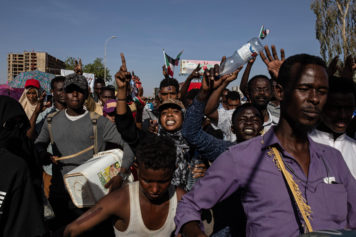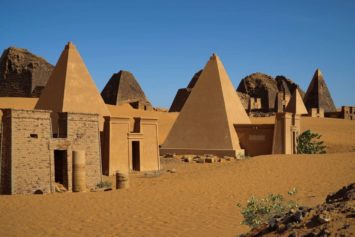CAIRO (AP) — Sudan’s military overthrew President Omar al-Bashir on Thursday after months of bloody protests over his repressive 30-year rule. But pro-democracy demonstrators vowed to keep up their campaign in the streets after the military said it would govern the country for the next two years.
Al-Bashir’s fall came a week after Algeria’s long-ruling, military-backed president, Abdelaziz Bouteflika, was driven from power. Together, the developments echoed the Arab Spring uprisings eight years ago that brought down autocrats across the Mideast.
The announcement of the arrest and removal of the 75-year-old al-Bashir was made by a veteran insider in his government, Defense Minister Awad Mohammed Ibn Ouf, who is under U.S. sanctions for links to atrocities in Sudan’s Darfur conflict.
Ibn Ouf said a military council that will be formed by the army, intelligence agencies and security apparatus will rule for two years, after which “free and fair elections” will take place.
He also announced that the military had suspended the constitution, dissolved the government, declared a state of emergency for three months, closed the country’s borders and airspace and imposed a curfew starting Thursday night.
Protesters who were initially jubilant over word of the coup reacted by saying they will not end their nearly week-long sit-in outside the military’s headquarters in central Khartoum until a civilian transition government is formed.
Well after nightfall, tens of thousands beat drums, sang and chanted slogans against the armed forces and ibn Ouf.
“The first one fell, the second will, too!” they shouted. And: “They removed a thief and brought in a thief!”
“What is happening in Sudan is that the old system is being rebuilt in new clothes,” said one activist, Mohammed Hisham. “I’m 30 years old and my whole life we have suffered from lack of freedom and continuous threats.”
Al-Bashir’s whereabouts were not immediately known. Ibn Ouf said only that he was being held in “a safe place.”
Human rights groups urged Sudanese military authorities to hand al-Bashir over to the International Criminal Court, where he faces charges of war crimes, crimes against humanity and genocide for his deadly campaign against insurgents in Darfur.
Amnesty International’s secretary general, Kumi Naidoo, said al-Bashir is wanted for “some of the most odious human rights violations of our generation.”
Al-Bashir came to power in a coup of his own in 1989, backed by the military and Islamist hard-liners. He kept an iron grip on power and brutally suppressed any opposition, while monopolizing the economy through allied businessmen.
Over his three decades in control, he was forced to allow the secession of South Sudan after years of war, a huge blow to the north’s economy. He became an international pariah over the bloodletting in Darfur. And the U.S. targeted his government repeatedly with sanctions and airstrikes for his support of Islamic militants.
Throughout, he was a swaggering figure known to break into dance and wave his cane in front of cheering crowds.
The protests — involving a mix of young activists, students, professional-employee unions and opposition parties — erupted in December and were initially fueled by anger over the deteriorating economy but quickly turned to demands for the president’s ouster.
Security forces came down hard on the protesters with tear gas, rubber bullets, live ammunition and batons, and the clashes left dozens of people dead over the past few months. Al-Bashir banned unauthorized public gatherings, imposed a state of emergency and granted sweeping powers to the police.
After Bouteflika’s resignation in Algeria, the protests escalated and the clampdown grew bloodier, with at least 22 people killed since Saturday.
Word of al-Bashir’s overthrow initially set off cheering, dancing and singing in the streets by thousands of protesters, until they heard the official announcement from ibn Ouf that the military would remain in charge.
The defense chief denounced al-Bashir’s government for “bad administration, systemic corruption, absence of justice,” adding: “The poor became poorer and the rich became richer. Hope in equality has been lost.” He also said al-Bashir’s crackdown against protesters risked splitting the security establishment and “could cause grave casualties.”
Mariam al-Mahdi, a leading member of the opposition Umma, called the military’s takeover “a dangerous move.”
“Our demands are clear: We don’t want to replace a coup with a coup,” al-Mahdi said.
In Washington, State Department spokesman Robert Palladino said the Sudanese people “have been clear and are demanding a civilian-led transition. And the United States position is that the Sudanese people should be allowed to do so sooner than two years from now.”


